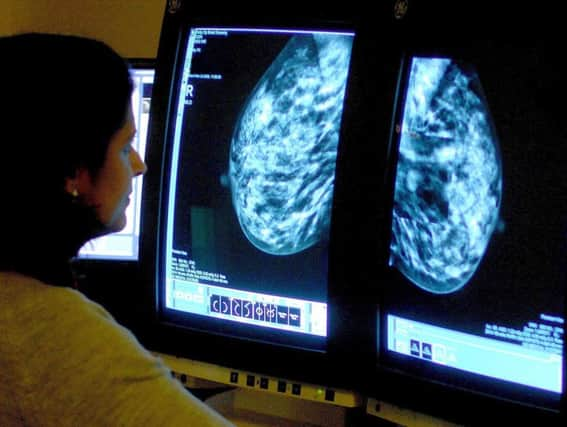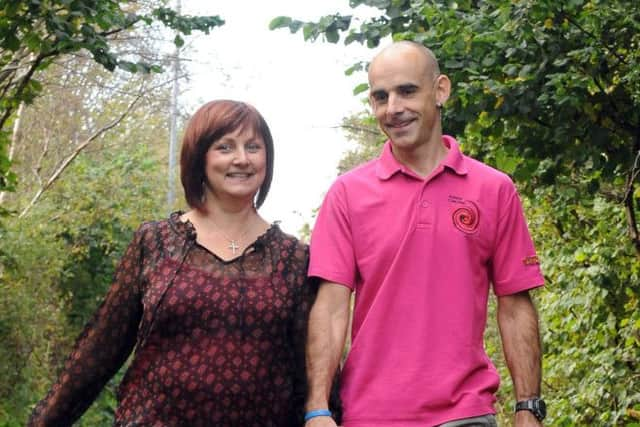Breast cancer Scots denied life-extending drugs


The Scottish Medicines Consortium (SMC) announced it was unable to recommend trastuzumab emtansine, also known as Kadcyla, for treating patients suffering from the HER2-positive form of the disease, for financial reasons.
Campaigners at the charity Breakthrough Breast Cancer branded the decision as “simply devastating news for women with secondary breast cancer, a cancer that will take their lives at some point, with many facing very limited treatment options”.
Advertisement
Hide AdAdvertisement
Hide AdBut SMC chairman Professor James Fox said while the decision “to not recommend a life-extending medicine is never taken lightly”, he said access to new medicines “cannot come at any price”.


He added: “This is a devastating condition and we understand that this decision will be very disappointing for patients.”
The decision was one of the first to be made using a new SMC procedure in a bid to increase access to treatments for those nearing the end of their lives and patients with very rare conditions.
The Patient and Clinician Engagement (Pace) process allows the SMC to take greater account of the views of doctors and charities involved with patients.
Prof Fox added: “Trastuzumab emtansine is an effective medicine which would be very much welcomed by patients and clinicians alike. We took this on board and applied as much flexibility as we could in our considerations but the committee felt unable to accept it.”
If approved, Kadcyla would cost NHS Scotland £1.82 million in its first year, rising to £4.98m after five years, with the drug would have been available to 118 women in Scotland who have HER2-positive. The cost of each patient’s treatment is estimated to be £110,000 a year.
James Jopling, the Scotland director for Breakthrough Breast Cancer, said: “Kadcyla has been shown to be an extremely effective drug that is now out of reach for both the women that desperately need it and the oncologists that want to be able to provide it.
“Support for this drug has united the entire breast cancer community. Patients, families, carers, oncologists and all four breast cancer charities in Scotland have called for this medicine to be approved.
Advertisement
Hide AdAdvertisement
Hide AdHe added: “Though we recognise the very high cost of this medicine made it hard for the SMC to approve, it becomes more vital than ever that pharmaceutical companies do more to set the cost of new medicines at a price the NHS can afford.”
Lesley Stephen, 48, from Edinburgh, who is HER2-positive, said she was “devastated by the decision”. She added: “I was diagnosed with secondary breast cancer six months ago, and since then have been undergoing gruelling chemotherapy to reduce the cancer.
“I have been receiving fantastic treatment through the NHS but I struggle to understand this decision, which effectively puts a price on my life.”
Health secretary Alex Neil said: “As happens currently, any patient with secondary breast cancer whose clinician believes that Kadycla will be of significant benefit, can make a request to their health board to access the drug.
“However this is clearly not the ideal situation for patients and clinicians in Scotland, and I hope that the manufacturer will resubmit Kadycla quickly and at a fair price.”
Case study: Drug firms really need to compromise
Samantha Davison, a 47-year-old mother of two from Dunfermline had pinned her hopes on having access to Kadcyla.
She was diagnosed with a primary cancer in 2005 and underwent a lumpectomy. She then endured five months of gruelling chemotherapy followed by intensive radiation treatment.
She was clear of the disease for four years before a new lump was discovered. Tests showed her condition had progressed and was incurable. Samantha has been taking Herceptin, a highly rated drug that was finally approved for NHS use after a similar controversy over cost versus prognosis.
Advertisement
Hide AdAdvertisement
Hide AdSamantha expressed her disappointment that the SMC had chosen to follow their English counterparts the National Institute for Health and Care Excellence (NICE) in denying access to Kadcyla on the grounds of cost.
She said: “I’m greatly disappointed, although there was a part of me that thought that despite NICE saying no for England and Wales, the SMC might find a way to approve the drug but I’m not surprised by their decision to follow suit.
“There was a glimmer of hope but the trouble is NICE is such a big organisation that I feel the SMC were always going to follow what NICE had said.
“I just hope that this is not the end and hopefully they’ll (SMC) go on and there will be further talks.
“This has been said many times already but I think the manufacturers really need to compromise a bit more and come down on the price.”